新概念英语第二册Lesson 11 One good turn deserves another 课件(共66张PPT)
文档属性
| 名称 | 新概念英语第二册Lesson 11 One good turn deserves another 课件(共66张PPT) | 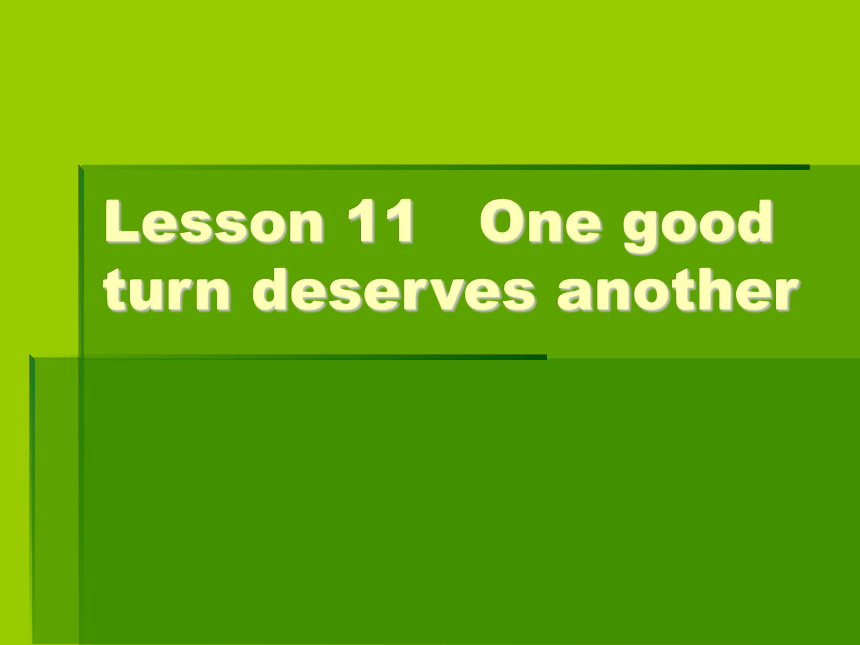 | |
| 格式 | pptx | ||
| 文件大小 | 515.1KB | ||
| 资源类型 | 教案 | ||
| 版本资源 | 新概念英语 | ||
| 科目 | 英语 | ||
| 更新时间 | 2023-10-06 07:28:43 | ||
图片预览

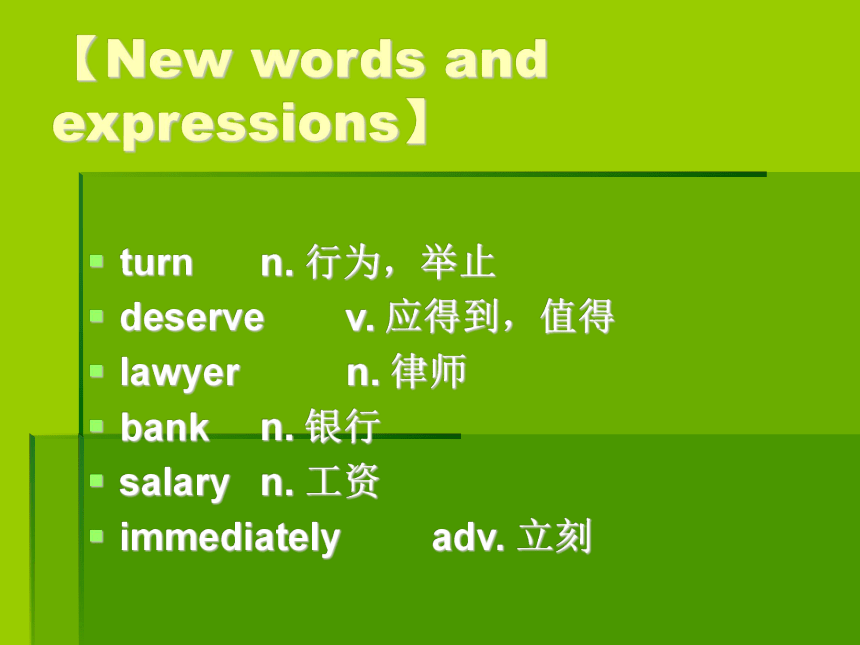
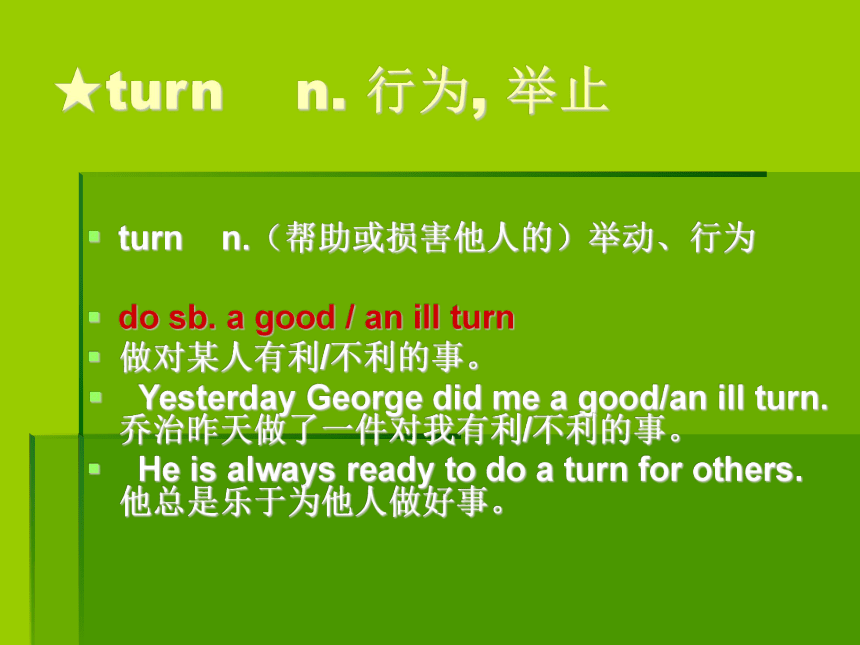
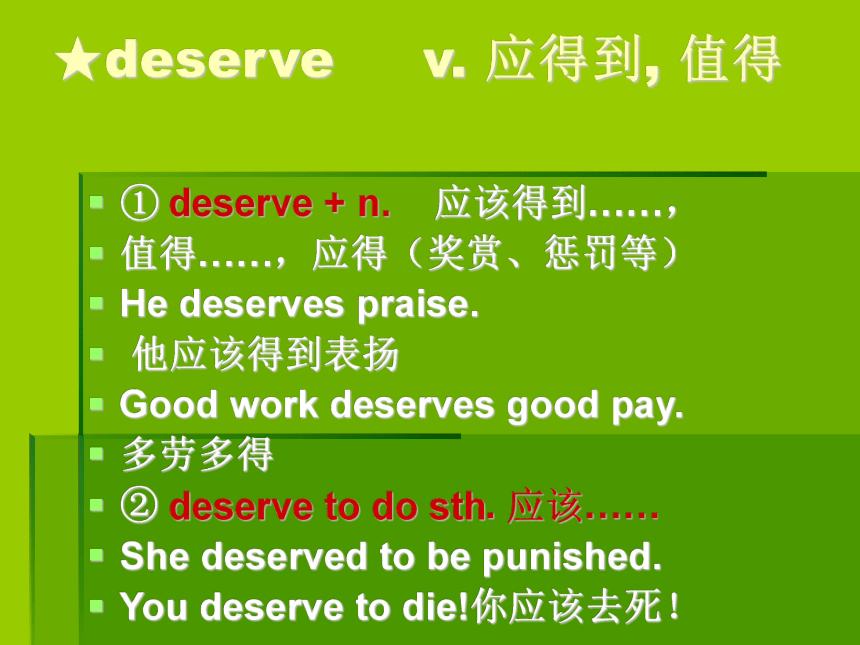
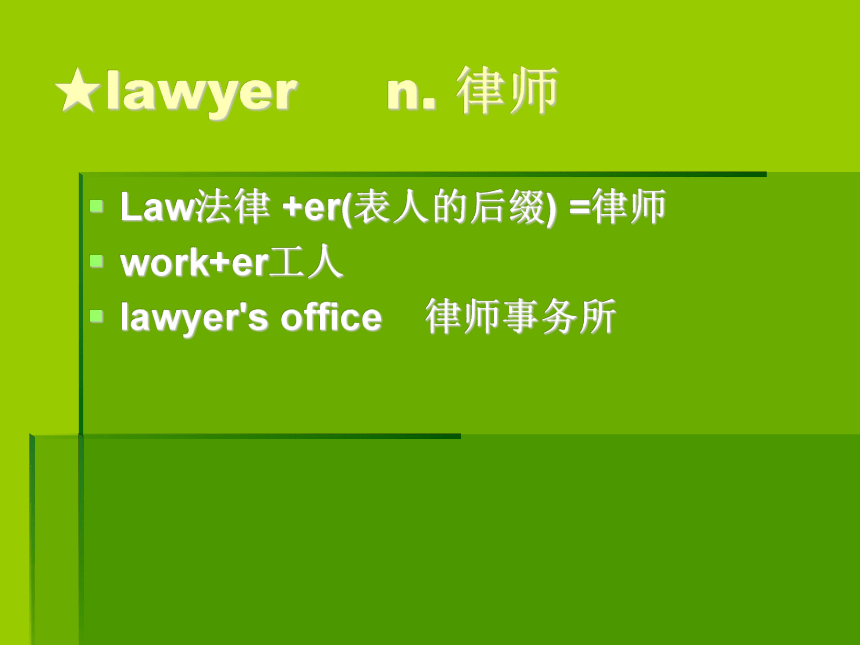
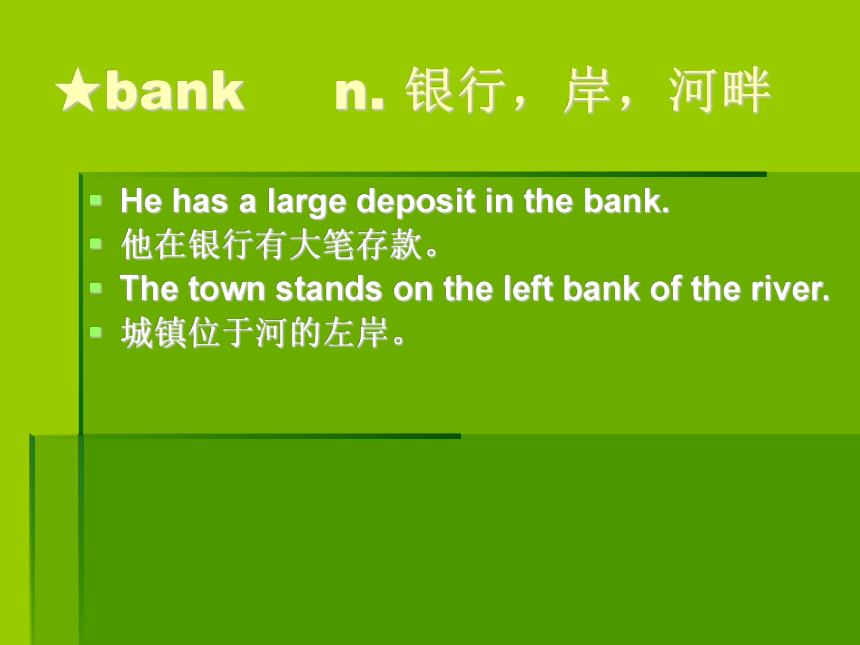
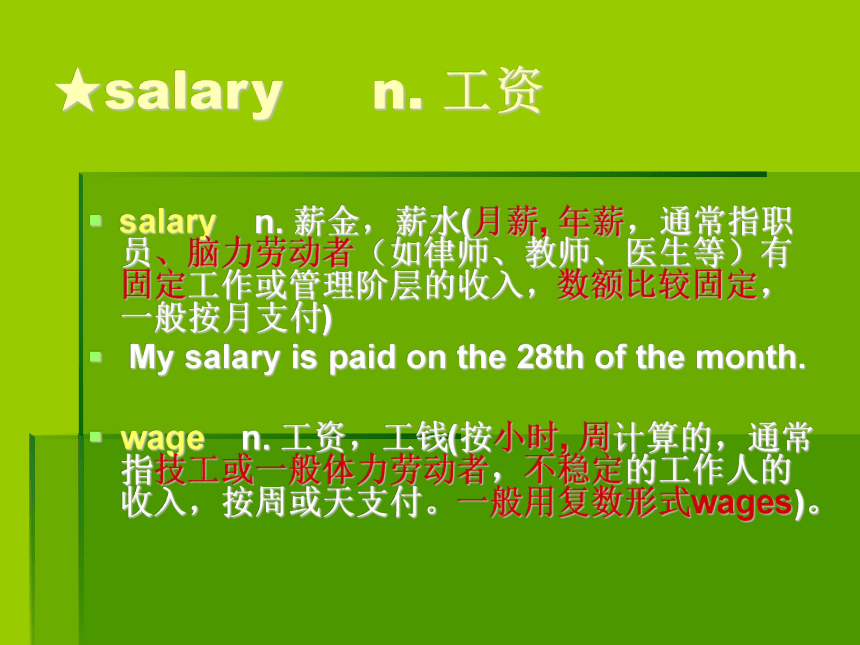
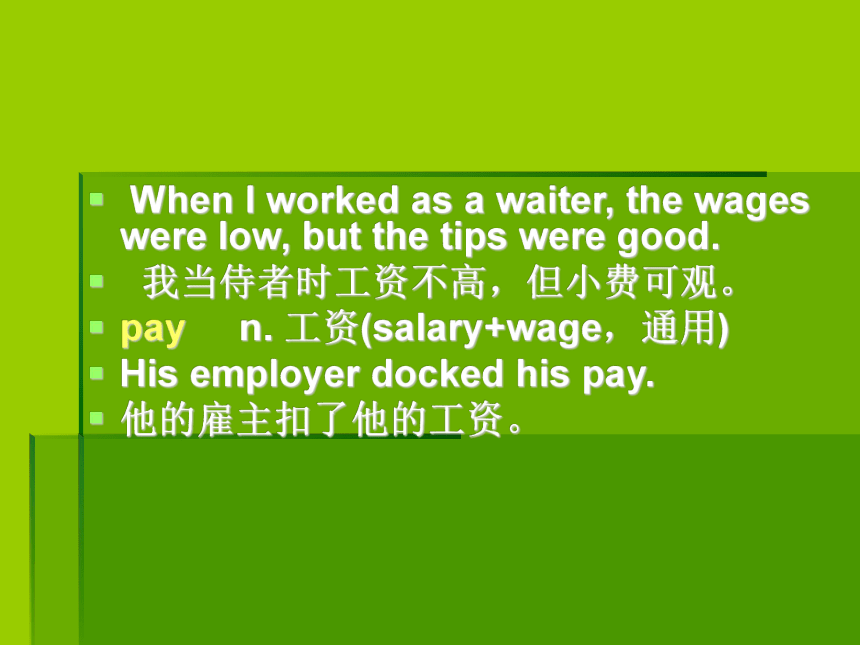



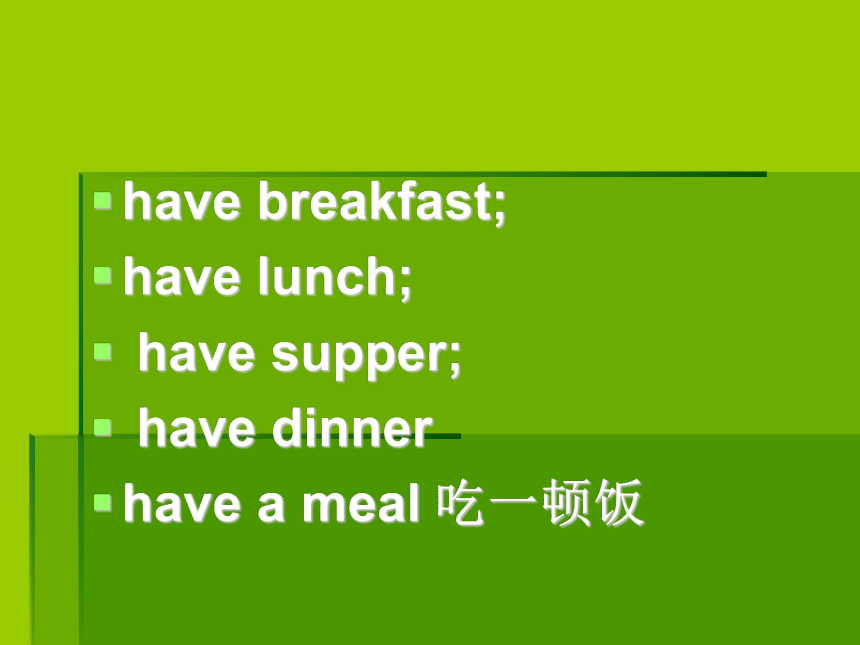
文档简介
(共66张PPT)
Lesson 11 One good turn deserves another
【New words and expressions】
turn n. 行为,举止
deserve v. 应得到,值得
lawyer n. 律师
bank n. 银行
salary n. 工资
immediately adv. 立刻
★turn n. 行为, 举止
turn n.(帮助或损害他人的)举动、行为
do sb. a good / an ill turn
做对某人有利/不利的事。
Yesterday George did me a good/an ill turn. 乔治昨天做了一件对我有利/不利的事。
He is always ready to do a turn for others. 他总是乐于为他人做好事。
★deserve v. 应得到, 值得
① deserve + n. 应该得到……,
值得……,应得(奖赏、惩罚等)
He deserves praise.
他应该得到表扬
Good work deserves good pay.
多劳多得
② deserve to do sth. 应该……
She deserved to be punished.
You deserve to die!你应该去死!
★lawyer n. 律师
Law法律 +er(表人的后缀) =律师
work+er工人
lawyer's office 律师事务所
★bank n. 银行,岸,河畔
He has a large deposit in the bank.
他在银行有大笔存款。
The town stands on the left bank of the river.
城镇位于河的左岸。
★salary n. 工资
salary n. 薪金,薪水(月薪, 年薪,通常指职员、脑力劳动者(如律师、教师、医生等)有固定工作或管理阶层的收入,数额比较固定,一般按月支付)
My salary is paid on the 28th of the month.
wage n. 工资,工钱(按小时, 周计算的,通常指技工或一般体力劳动者,不稳定的工作人的收入,按周或天支付。一般用复数形式wages)。
When I worked as a waiter, the wages were low, but the tips were good.
我当侍者时工资不高,但小费可观。
pay n. 工资(salary+wage,通用)
His employer docked his pay.
他的雇主扣了他的工资。
★immediately adv. 立刻
right away =at once =immediately 立刻, 马上
right now 现在
One good turn deserves another
礼尚往来, 善有善报
one bad turn deserves another
恶有恶报
I was having dinner at a restaurant when Tony Steele came in.
过去某一特定时候正在进行的动作,用过去进行时。
while+从句, 动词一定是延续性动词
when+延续性动词/瞬间动词
While/when my mother was doing the housework, my father was watching TV.
have breakfast;
have lunch;
have supper;
have dinner
have a meal 吃一顿饭
2、Tony worked in a lawyer's office years ago, but he is now working at a bank.
work for… 为…工作;受雇于…强调工作
Tom works for this firm
汤姆在这家公司工作
work in/at… 强调in后面的地点
working at a bank
(some/several) years ago 名词-s,前面省略了some
3、He gets a good salary, but he always borrows money from his friends and never pays it back.
borrow sth. from sb. 从……借来……
Never “从来不”, 前面不需要加助动词,放在实义动词前
1 )pay“偿还(债务等)”,
pay back 还钱
2)Vt. & Vi. “付,支付(价款、账单)”。
Pay for sth. / sb. 为某人或某物付款。
Pay+ 价钱 / 账单 支付钱/账单。
I paid 100 Yuan for the dress.
I paid the bill.
He gets a good salary…他的薪水很高……
good在这里的意思是“相当大/多的”、“相当可观的”:
It takes me a good three hours to get there.
我花了整整3小时才到达那里。
1工资很高:a good salary; a high salary; a fat salary
工资很低:a poor salary; a low salary
2 borrow 借入
borrow sth from sb
lend 借出
lend sth to sb / lend sb sth
3pay 在这里的意思是“偿还(债务等)”,还可解释为“付,支付(价款、账单)等”。Pay 既是及物动词也可以是不及物动词。
pay-paid-paid
pay…back 还钱
pay money for……为…付款 pay for 付款
I have paid 20 dollars for the book.
pay back = return the amount of money =repay还钱
pay off 还清
pay off the debt 还清债务
pay back:
(1) 还钱;还债
He promised to pay back tomorrow.
他答应明天还钱。
I'll pay back the money you lent me next week.
下星期我把你借给我的钱还给你。
Will you lend me £5 I will pay you back next month.
借给我五英镑钱好吗?我下个月还你。
(2) 报仇;报复
One day I'll pay back that boy who broke my bike!
总有一天我得对弄坏我自行车的那个男孩报复一下!
I'll pay him back blow for blow.
我会以牙还牙地报复他。
pay off:
(1) 全部偿清
After all these years,we've at last paid off all our debts.
经过这么多年,我们总算把债还清了。
(2) 给薪解雇
The crew have been paid off.
船员被发薪遣散。
pay for
(1) 付钱;支付
How much did you pay for that book
买那本书你花了多少钱?
I paid £1,000 for this house.
我买这所房子花了一千英镑。
I'm quite able to pay for this suit.
这套衣服的钱我完全付得起。
(2) 付出代价;受惩罚
He will have to pay for this foolish behaviour.
他将要为这种愚蠢行为而受报应。
You will pay for your dishonesty.
你不老实,总有一天会吃苦头的。
He paid for his laziness by not passing his exam.
他没有通过考试,这是他懒而受到的惩罚。
eg.这辆车我花了十万元。
我会还你钱的/ 我会报复你的。
I paid 100,000 yuan for this car. eg.
I'll pay you back.
表花费的词:
spend:(人)spend time/money/energy on sth / (in) doing sth
(人)在花时间/金钱/精力,在某事上/用来做某事
cost v. (主语是:事情,某物)花费 cost-cost- cost
take:It takes(took) sb some time to do sth. 做某事花某人时间
eg. It takes me 20 minutes to go to work every day.
cost、pay、spend和take的区别
spend的主语必须是人, 常用于以下结构:(1) spend time /money on sth. 在……上花费时间(金钱).
例:I spent two hours on this maths problem. 这道数学题花了我两个小时.
(2) spend time / money (in) doing sth. 花费时间(金钱)做某事.例:
They spent two years (in) building this bridge. 造这座桥花了他们两年时间.
(3)spend money for sth. 花钱买…….例:
His money was spent for books. 他的钱用来买书了.
cost的主语是物或某种活动, 还可以表示“值”, 常见用法如下:
(1)sth. costs (sb.) +金钱,某物花了(某人)多少钱.例:
A new computer costs a lot of money.
买一台新电脑要花一大笔钱.
(2) (doing) sth. costs (sb.) +时间,某物(做某事)花了(某人)多少时间.
例:Remembering these new words cost him a lot of time.
他花了大量时间才记住了这些单词.
注意:cost的过去式及过去分词都是cost,并且不能用于被动句.
take后面常跟双宾语, 常见用法有以下几种:(1) It takes sb. +时间+to do sth. 做某事花了某人多少时间.例:
It took them three years to build this road. 他们用了三年时间修完了这条路.
(2)doing sth. takes sb. +时间,做某事花了某人多少时间.例:
Repairing this car took him the whole afternoon.
他花了一下午修车.
pay的基本用法是:
(1) pay (sb.) money for sth. 付钱(给某人)买…….例:
I have to pay them 20 pounds for this room each month. 我每个月要付20英磅的房租.
(2)pay for sth. 付……的钱.例:
I have to pay for the book lost. 我不得不赔丢失的书款.
(3)pay for sb. 替某人付钱.例:Don't worry!I'll pay for you. 别担心, 我会给你付钱的.
(4)pay sb. 付钱给某人. 例: They pay us every month.他们每月给我们报酬.
(5)pay money back 还钱.例:May I borrow 12 yuan from you I'll pay it back next week. 你能借给我12块钱吗 下周还你.
(6)pay off one's money还清钱.
return 归还:
return + n. + to… 把…还给某人;把…归还某处
eg. Will you return my key to the car
你把车钥匙还给我,好吗?
eg. You should return the book to the shelf after you read it.
repay 1) 偿还,还钱
eg. He has not repaid me $ 10 yet.
他还没还我10 美元呢。
2) 报答,回报(某人)
eg. I will repay her for her kindness.
我会报答她的好意的。
or: I will repay her kindness.
4、Tony saw me and came and sat at the same table.
at the same table 坐在同一张桌子旁边
at table 吃饭
at the table 坐在桌子旁边
并列谓语
同一个主语同时或先后要执行两种以上的动作或行为时,没有必要多次重复主语,所以形成几个动词连用的句式,这些动词同时担当谓语角色,这些动词连用称为并列谓语
While he was eating, I asked him to lend me twenty pounds.
ask sb. to do sth. 要某人做…….
lend sb. sth.借给某人某物。
borrow sth. from sb.从sb借来sth.
To my surprise, he gave me the money immediately.
To one’s surprise 令某人惊讶的是
5、'I have never borrowed any money from you,' Tony said, 'so now you can pay for my dinner!'
It's my treat. 我请客
Let's go dutch. AA制
New words and phrases
好行为
值得,应得
律师
银行
工资
立刻
向某人借……
借给某人……
good turn
deserve [ di'z :v ]
lawyer [ 'l :j ]
bank
salary [ 's l ri ]
immediately[ i'mi:dj tli ]
borrow sth. from sb.
lend sb. sth.
find out the phrases
进来
一家律师事务所
有一份好薪水
从不归还
坐在同张桌子边
为..付钱
另我惊奇的是
come in
a lawyer’s office
get a good salary
never pay back
sit at the same table
pay for
To my surprise
Listen to the tape and fill in blanks
I _______ dinner at a restaurant when Tony Steele ________. Tony worked in a _________ office years ago, but he is now working at a _____. He gets a good _____, but he always ______ money _____ his friends and never _____ it _______. Tony saw me and came and _________ the same table. He has never borrowed money from me. While he was eating, I asked him to _________ twenty pounds. To my surprise, he gave me the money ________. “I have never borrowed _____ money from you.” Tony said, “so now you can _______ my dinner!”
was having
came in
lawyer’s
bank
salary
borrows
from
pays back
sat at
lend me
immediately
any
pay for
pay back /pay off /pay for
pay back
[1]偿还,还钱给(某人);
EG: Will you lend me $10 I will pay you back next month.能借给我10美元吗?我下个月还你。
[2]回报。EG: How can I pay you back for all your kindness 我该怎样报答你的好意呢?
pay back /pay off /pay for
pay off
[1]还清(债),给清工资后遣散; EG: It took him six years to pay off the loan.
[2]得到好结果, 使…得益(be successful)。
EG: We worked away for months in all weathers, and the hard work at last pay off very much.我们不论天气好坏,连续干了三个月,艰苦的劳动终于有了很好的结果。
pay back /pay off /pay for
pay XX yuan for sth
Pay for 付款
Pay for sth
Eg.Must I pay for the hotel with my credit card
我必须用信用卡付款吗
off for back
Should I pay ___ the drinks
We should be able to pay __ the debt within two years.
He will pay ____ the money in monthly installment
Did your plan pay ___
★参考译文:
我正在一家饭馆吃饭, 托尼.斯蒂尔走了进来. 托尼曾在一家律师事务所工作, 而现在正在一家银行上班. 他的薪水很高, 但他却总是向朋友借钱, 并且从来不还. 托尼看见了我, 就走过来和我坐到一张桌子前. 他从未向我借过钱. 当他吃饭时, 我提出向他借20英镑. 令我惊奇的是, 他立刻把钱给了我. “我还从未向你借过钱, “托尼说道, “所以现在你可以替我付饭钱了!”
Text Explanation
I was having dinner at a restaurant when Tony Steele came in. Tony worked in a lawyer's office years ago, but he is now working at a bank. He gets a good salary, but he always borrows money from his friends and never pays it back. Tony saw me and came and sat at the same table. He has never borrowed money from me. While he was eating, I asked him to lend me twenty pounds. To my surprise, he gave me the money immediately. 'I have never borrowed any money from you,' Tony said, 'so now you can pay for my dinner!'
【key structure】
现在正在进行的动作
is/am/are + doing (v-ing)
I am playing the guitar now.
通常发生的事
一般现在时
(do) v-原型
I always get up at 7.
过去发生的事
v-过去式(did)
I bought a new dress yesterday.
已经发生的事
has/have + (done) v-过分
He has learnt English for 3 years.
过去某一特定时间正在进行的事
was/were+ (doing) v-ing
When he came in , I was singing.
Key structures(P53)
Exercises C
1 He usually _gets_ (get) up at 7 o'clock, but this morning he _got_ (get) up at 6 o'clock.
2 So far, we not _have not had _ (have) a reply.
3 While he _was writing_ (write) on the blackboard, the children _were talking_ (talk).
4 I can't come now. At the moment I _am typing_ (type) a letter.
5 As the royal visitors _were passing_ (pass), the people cheered.
【Special Difficulties】
动词+名词/代词+带to的不定式
某些动词之后的带to的不定式之前可以有一个名词或代词。有些动词后的名词/代词可有可无,但有和没有经常影响影响整个句子的意义。
I want to speak to John.
I want you to speak to John.
I’d like sb. to do sth.
I’d like to do sth.
还有一些动词后面用不定式作宾语时,其后通常必须有一名词或代词。这类动词有allow,advise,help,teach,tell,request等,这类动词不但可用于主动语态,也可用于被动语态:
My father did not allow us to see the picture.
hope一定不能说hope sb. to do sth.,正确用法是hope to do
Begin的用法
1)begin既可以作不及物动词,如:the class begins和the movie begins等。
2)但是它也可以做及物动词,用法类似于start,后面可以直接加宾语。 如:I began my class with a humorous story.
变成被动即为:My class was begun with a joke (by me).
3)不过用做不及物动词时居多,上句的确也可以写成: My class began with a humorous story.
4 at the moment用现在进行时
since(+时间点) 自从……,用现在完成时
since yesterday
for(+时间段) 一段……,用现在完成时
for three hours;for a day;for three days
three days ago 用一般过去时
8 good salary 不错的薪水
well表示好的时候一般用作副词
fine用来形容天气好, 质量好
beautiful 美丽,漂亮的
10 .pay back 还钱;pay something 付钱;pay again 再次付钱;pay it 付钱
once more=again
repay it =pay back
动词+名词/代词+带to的不定式
★语序:有些动词的后面用动词不定式作宾语时,往往要在动词后面先加上一个名词或代词。有些动词后的名词/代词可有可无,但有和没有经常不会影响整个句子的意义。
eg. I ask him to lend me twenty pounds.him是不定式to lend的逻辑主语
eg. He wants me to ask you a question.
eg. Frank helped Tom to dig this hole.
eg. She taught her son to read.
eg. We advise them to stay at home.
eg. They did not allow us to enter the museum before 9 o'lock.
总结:
want sb to do sth ask sb to do sth
allow sb to do sth help sb to do sth or: help sb do sth
beg sb to do sth teach sb to do sth
advise sb to do sth expect sb to do sth
hope一定不能说hope sb. to do sth.,正确用法是hope to do (希望自己)或hope that(希望别人)
salary 月薪(非体力劳动者)
wages 周薪(体力劳动者)
eg. He collects his salary at the end of each month. 他每个月末领取工资。
eg. The workmen collected their wages at the end of the week. 工人们每周末领取工资。
borrow 借进来 lend 借出去
eg. He has never borrowed any money from me.
eg. I asked him to lend me $20.
I asked him to lend $20 to me.
I was having dinner at a restaurant. I saw Tony Steele after a while. He always borrows money from his friends. Tony sat at my table. I asked him to lend me twenty pounds. He gave me the money at once. He wanted me to pay for his dinner.
【Special Difficulties】
动词+名词/代词+带 to的不定式
某些动词之后的带to的不定式之前可以有一个名词或代词。有些动词后的名词/代词可有可无,但有和
没有经常影响影响整个句子的意义。
I asked him to lend me twenty pounds.
I want to speak to John.
I want you to speak to John.
Would you like to do sth.
I’d like sb. to do sth.
I’d like to do sth.
还有一些动词后面用不定式作宾语时,其后通常必须有一名词或代词。这类动词有allow,advise,help,teach,tell,request等,这类动词不但可用于主动语态,也可用于被动语态:
We were not allowed to see the picture.
hope一定不能说hope sb. to do sth.,正确用法是hope to do (希望自己)或hope that(希望别人)
有些动词的后面用动词不定式作宾语时,
往往要在动词后面先加上一个名词或代词。
注意以下句中的语序,在动词后面均有一个代词或名词(用红色斜体印出)。
He wants me to ask you a question.他让我问你一个问题。
Bill helped Tony to dig this hole.比尔帮助托尼挖了这个洞。
She taught her son to read.她教儿子读书。
We advised them to stay at home.我们建议他们呆在家里。
They did not allow us to enter the museum before nine o’clock.他们不准许我们在九点之前进博物馆。
练习答案 Key to written exercises
1.关键句型练习答案
A
a he is now working (1.2)
b he gets (1.3); he always borrows (1.3); never pays it back (1.4)
c came in…worked (11.2-2); Tony saw (1.4); came and sat (1.4); I asked him (1.6); he gave me (1.7); Tony said (1.8)
d He has never borrowed (1.5); I have never borrowed (1.7)
e I was having (1.1); he was eating (1.6)
C 1 gets…got
2 have not had
3 was writing…talked/ were talking
4 am typing
5 passed/ were passing
D The Taj Mahal was built…after he became/ had become ruler, his wife…died. The Taj Mahal was built in her honour. Experts were called in…The Taj Mahal, which was begun in 1632 and (was) completed in 1654, cost a fortune…it has been visited by…
2.难点练习答案
a
A 1 The officer ordered the men to fire at the enemy.
2 He wants his wife to wear this dress.
3 She wants us to explain it.
4 I cannot allow him to enter the room.
B (sample sentences)
1 He asked me to help him.
2 We preferred her to stay at home.
3 He taught me to speak English.
4 My mother wished me to collect the laundry3.
5 Do you want her to visit you
b
1 salary 2 lent…salary/ wages 3 borrowed 4 wages 5 wages
3.多项选择题答案
1 b 2 b 3 b 4 a 5 b 6 c
7 c 8 a 9 c 10 c 11b 12 d
【Multiple choice questions】
1 Tony is working at a bank ______ .
a. at the moment b. a year ago
c. since last year d. for a year
at the moment用现在进行时
since(+点时间)自从…,用现在完成时
since yesterday
for(+段时间) 一段……,用现在完成时
for three hours;for a day;for three days
since three days ago 用一般过去时
【Multiple choice questions】
2 He gets a good salary. His salary is very _____ .
a. good b. well c. fine d. beautiful
good salary 不错的薪水
well表示好的时候一般用作副词
fine用来形容天气好, 质量好
beautiful 美丽,漂亮的
【Multiple choice questions】
3 Tony must pay the money back. He must _____ .
a. pay it again b. pay it
c. repay it d. pay it once more
pay back 还钱;pay something 付钱;pay again 再次付钱;pay it 付钱
once more=again
repay it =pay back
【Multiple choice questions】
There aren't enough chairs here for us all. Please bring_____ one.
a.other b.another c.extra d.a different
one在这里是代词,指代上文的名词,指代单数可数名词,可数名词单数前一定要加’a/an’
Lesson 11 One good turn deserves another
【New words and expressions】
turn n. 行为,举止
deserve v. 应得到,值得
lawyer n. 律师
bank n. 银行
salary n. 工资
immediately adv. 立刻
★turn n. 行为, 举止
turn n.(帮助或损害他人的)举动、行为
do sb. a good / an ill turn
做对某人有利/不利的事。
Yesterday George did me a good/an ill turn. 乔治昨天做了一件对我有利/不利的事。
He is always ready to do a turn for others. 他总是乐于为他人做好事。
★deserve v. 应得到, 值得
① deserve + n. 应该得到……,
值得……,应得(奖赏、惩罚等)
He deserves praise.
他应该得到表扬
Good work deserves good pay.
多劳多得
② deserve to do sth. 应该……
She deserved to be punished.
You deserve to die!你应该去死!
★lawyer n. 律师
Law法律 +er(表人的后缀) =律师
work+er工人
lawyer's office 律师事务所
★bank n. 银行,岸,河畔
He has a large deposit in the bank.
他在银行有大笔存款。
The town stands on the left bank of the river.
城镇位于河的左岸。
★salary n. 工资
salary n. 薪金,薪水(月薪, 年薪,通常指职员、脑力劳动者(如律师、教师、医生等)有固定工作或管理阶层的收入,数额比较固定,一般按月支付)
My salary is paid on the 28th of the month.
wage n. 工资,工钱(按小时, 周计算的,通常指技工或一般体力劳动者,不稳定的工作人的收入,按周或天支付。一般用复数形式wages)。
When I worked as a waiter, the wages were low, but the tips were good.
我当侍者时工资不高,但小费可观。
pay n. 工资(salary+wage,通用)
His employer docked his pay.
他的雇主扣了他的工资。
★immediately adv. 立刻
right away =at once =immediately 立刻, 马上
right now 现在
One good turn deserves another
礼尚往来, 善有善报
one bad turn deserves another
恶有恶报
I was having dinner at a restaurant when Tony Steele came in.
过去某一特定时候正在进行的动作,用过去进行时。
while+从句, 动词一定是延续性动词
when+延续性动词/瞬间动词
While/when my mother was doing the housework, my father was watching TV.
have breakfast;
have lunch;
have supper;
have dinner
have a meal 吃一顿饭
2、Tony worked in a lawyer's office years ago, but he is now working at a bank.
work for… 为…工作;受雇于…强调工作
Tom works for this firm
汤姆在这家公司工作
work in/at… 强调in后面的地点
working at a bank
(some/several) years ago 名词-s,前面省略了some
3、He gets a good salary, but he always borrows money from his friends and never pays it back.
borrow sth. from sb. 从……借来……
Never “从来不”, 前面不需要加助动词,放在实义动词前
1 )pay“偿还(债务等)”,
pay back 还钱
2)Vt. & Vi. “付,支付(价款、账单)”。
Pay for sth. / sb. 为某人或某物付款。
Pay+ 价钱 / 账单 支付钱/账单。
I paid 100 Yuan for the dress.
I paid the bill.
He gets a good salary…他的薪水很高……
good在这里的意思是“相当大/多的”、“相当可观的”:
It takes me a good three hours to get there.
我花了整整3小时才到达那里。
1工资很高:a good salary; a high salary; a fat salary
工资很低:a poor salary; a low salary
2 borrow 借入
borrow sth from sb
lend 借出
lend sth to sb / lend sb sth
3pay 在这里的意思是“偿还(债务等)”,还可解释为“付,支付(价款、账单)等”。Pay 既是及物动词也可以是不及物动词。
pay-paid-paid
pay…back 还钱
pay money for……为…付款 pay for 付款
I have paid 20 dollars for the book.
pay back = return the amount of money =repay还钱
pay off 还清
pay off the debt 还清债务
pay back:
(1) 还钱;还债
He promised to pay back tomorrow.
他答应明天还钱。
I'll pay back the money you lent me next week.
下星期我把你借给我的钱还给你。
Will you lend me £5 I will pay you back next month.
借给我五英镑钱好吗?我下个月还你。
(2) 报仇;报复
One day I'll pay back that boy who broke my bike!
总有一天我得对弄坏我自行车的那个男孩报复一下!
I'll pay him back blow for blow.
我会以牙还牙地报复他。
pay off:
(1) 全部偿清
After all these years,we've at last paid off all our debts.
经过这么多年,我们总算把债还清了。
(2) 给薪解雇
The crew have been paid off.
船员被发薪遣散。
pay for
(1) 付钱;支付
How much did you pay for that book
买那本书你花了多少钱?
I paid £1,000 for this house.
我买这所房子花了一千英镑。
I'm quite able to pay for this suit.
这套衣服的钱我完全付得起。
(2) 付出代价;受惩罚
He will have to pay for this foolish behaviour.
他将要为这种愚蠢行为而受报应。
You will pay for your dishonesty.
你不老实,总有一天会吃苦头的。
He paid for his laziness by not passing his exam.
他没有通过考试,这是他懒而受到的惩罚。
eg.这辆车我花了十万元。
我会还你钱的/ 我会报复你的。
I paid 100,000 yuan for this car. eg.
I'll pay you back.
表花费的词:
spend:(人)spend time/money/energy on sth / (in) doing sth
(人)在花时间/金钱/精力,在某事上/用来做某事
cost v. (主语是:事情,某物)花费 cost-cost- cost
take:It takes(took) sb some time to do sth. 做某事花某人时间
eg. It takes me 20 minutes to go to work every day.
cost、pay、spend和take的区别
spend的主语必须是人, 常用于以下结构:(1) spend time /money on sth. 在……上花费时间(金钱).
例:I spent two hours on this maths problem. 这道数学题花了我两个小时.
(2) spend time / money (in) doing sth. 花费时间(金钱)做某事.例:
They spent two years (in) building this bridge. 造这座桥花了他们两年时间.
(3)spend money for sth. 花钱买…….例:
His money was spent for books. 他的钱用来买书了.
cost的主语是物或某种活动, 还可以表示“值”, 常见用法如下:
(1)sth. costs (sb.) +金钱,某物花了(某人)多少钱.例:
A new computer costs a lot of money.
买一台新电脑要花一大笔钱.
(2) (doing) sth. costs (sb.) +时间,某物(做某事)花了(某人)多少时间.
例:Remembering these new words cost him a lot of time.
他花了大量时间才记住了这些单词.
注意:cost的过去式及过去分词都是cost,并且不能用于被动句.
take后面常跟双宾语, 常见用法有以下几种:(1) It takes sb. +时间+to do sth. 做某事花了某人多少时间.例:
It took them three years to build this road. 他们用了三年时间修完了这条路.
(2)doing sth. takes sb. +时间,做某事花了某人多少时间.例:
Repairing this car took him the whole afternoon.
他花了一下午修车.
pay的基本用法是:
(1) pay (sb.) money for sth. 付钱(给某人)买…….例:
I have to pay them 20 pounds for this room each month. 我每个月要付20英磅的房租.
(2)pay for sth. 付……的钱.例:
I have to pay for the book lost. 我不得不赔丢失的书款.
(3)pay for sb. 替某人付钱.例:Don't worry!I'll pay for you. 别担心, 我会给你付钱的.
(4)pay sb. 付钱给某人. 例: They pay us every month.他们每月给我们报酬.
(5)pay money back 还钱.例:May I borrow 12 yuan from you I'll pay it back next week. 你能借给我12块钱吗 下周还你.
(6)pay off one's money还清钱.
return 归还:
return + n. + to… 把…还给某人;把…归还某处
eg. Will you return my key to the car
你把车钥匙还给我,好吗?
eg. You should return the book to the shelf after you read it.
repay 1) 偿还,还钱
eg. He has not repaid me $ 10 yet.
他还没还我10 美元呢。
2) 报答,回报(某人)
eg. I will repay her for her kindness.
我会报答她的好意的。
or: I will repay her kindness.
4、Tony saw me and came and sat at the same table.
at the same table 坐在同一张桌子旁边
at table 吃饭
at the table 坐在桌子旁边
并列谓语
同一个主语同时或先后要执行两种以上的动作或行为时,没有必要多次重复主语,所以形成几个动词连用的句式,这些动词同时担当谓语角色,这些动词连用称为并列谓语
While he was eating, I asked him to lend me twenty pounds.
ask sb. to do sth. 要某人做…….
lend sb. sth.借给某人某物。
borrow sth. from sb.从sb借来sth.
To my surprise, he gave me the money immediately.
To one’s surprise 令某人惊讶的是
5、'I have never borrowed any money from you,' Tony said, 'so now you can pay for my dinner!'
It's my treat. 我请客
Let's go dutch. AA制
New words and phrases
好行为
值得,应得
律师
银行
工资
立刻
向某人借……
借给某人……
good turn
deserve [ di'z :v ]
lawyer [ 'l :j ]
bank
salary [ 's l ri ]
immediately[ i'mi:dj tli ]
borrow sth. from sb.
lend sb. sth.
find out the phrases
进来
一家律师事务所
有一份好薪水
从不归还
坐在同张桌子边
为..付钱
另我惊奇的是
come in
a lawyer’s office
get a good salary
never pay back
sit at the same table
pay for
To my surprise
Listen to the tape and fill in blanks
I _______ dinner at a restaurant when Tony Steele ________. Tony worked in a _________ office years ago, but he is now working at a _____. He gets a good _____, but he always ______ money _____ his friends and never _____ it _______. Tony saw me and came and _________ the same table. He has never borrowed money from me. While he was eating, I asked him to _________ twenty pounds. To my surprise, he gave me the money ________. “I have never borrowed _____ money from you.” Tony said, “so now you can _______ my dinner!”
was having
came in
lawyer’s
bank
salary
borrows
from
pays back
sat at
lend me
immediately
any
pay for
pay back /pay off /pay for
pay back
[1]偿还,还钱给(某人);
EG: Will you lend me $10 I will pay you back next month.能借给我10美元吗?我下个月还你。
[2]回报。EG: How can I pay you back for all your kindness 我该怎样报答你的好意呢?
pay back /pay off /pay for
pay off
[1]还清(债),给清工资后遣散; EG: It took him six years to pay off the loan.
[2]得到好结果, 使…得益(be successful)。
EG: We worked away for months in all weathers, and the hard work at last pay off very much.我们不论天气好坏,连续干了三个月,艰苦的劳动终于有了很好的结果。
pay back /pay off /pay for
pay XX yuan for sth
Pay for 付款
Pay for sth
Eg.Must I pay for the hotel with my credit card
我必须用信用卡付款吗
off for back
Should I pay ___ the drinks
We should be able to pay __ the debt within two years.
He will pay ____ the money in monthly installment
Did your plan pay ___
★参考译文:
我正在一家饭馆吃饭, 托尼.斯蒂尔走了进来. 托尼曾在一家律师事务所工作, 而现在正在一家银行上班. 他的薪水很高, 但他却总是向朋友借钱, 并且从来不还. 托尼看见了我, 就走过来和我坐到一张桌子前. 他从未向我借过钱. 当他吃饭时, 我提出向他借20英镑. 令我惊奇的是, 他立刻把钱给了我. “我还从未向你借过钱, “托尼说道, “所以现在你可以替我付饭钱了!”
Text Explanation
I was having dinner at a restaurant when Tony Steele came in. Tony worked in a lawyer's office years ago, but he is now working at a bank. He gets a good salary, but he always borrows money from his friends and never pays it back. Tony saw me and came and sat at the same table. He has never borrowed money from me. While he was eating, I asked him to lend me twenty pounds. To my surprise, he gave me the money immediately. 'I have never borrowed any money from you,' Tony said, 'so now you can pay for my dinner!'
【key structure】
现在正在进行的动作
is/am/are + doing (v-ing)
I am playing the guitar now.
通常发生的事
一般现在时
(do) v-原型
I always get up at 7.
过去发生的事
v-过去式(did)
I bought a new dress yesterday.
已经发生的事
has/have + (done) v-过分
He has learnt English for 3 years.
过去某一特定时间正在进行的事
was/were+ (doing) v-ing
When he came in , I was singing.
Key structures(P53)
Exercises C
1 He usually _gets_ (get) up at 7 o'clock, but this morning he _got_ (get) up at 6 o'clock.
2 So far, we not _have not had _ (have) a reply.
3 While he _was writing_ (write) on the blackboard, the children _were talking_ (talk).
4 I can't come now. At the moment I _am typing_ (type) a letter.
5 As the royal visitors _were passing_ (pass), the people cheered.
【Special Difficulties】
动词+名词/代词+带to的不定式
某些动词之后的带to的不定式之前可以有一个名词或代词。有些动词后的名词/代词可有可无,但有和没有经常影响影响整个句子的意义。
I want to speak to John.
I want you to speak to John.
I’d like sb. to do sth.
I’d like to do sth.
还有一些动词后面用不定式作宾语时,其后通常必须有一名词或代词。这类动词有allow,advise,help,teach,tell,request等,这类动词不但可用于主动语态,也可用于被动语态:
My father did not allow us to see the picture.
hope一定不能说hope sb. to do sth.,正确用法是hope to do
Begin的用法
1)begin既可以作不及物动词,如:the class begins和the movie begins等。
2)但是它也可以做及物动词,用法类似于start,后面可以直接加宾语。 如:I began my class with a humorous story.
变成被动即为:My class was begun with a joke (by me).
3)不过用做不及物动词时居多,上句的确也可以写成: My class began with a humorous story.
4 at the moment用现在进行时
since(+时间点) 自从……,用现在完成时
since yesterday
for(+时间段) 一段……,用现在完成时
for three hours;for a day;for three days
three days ago 用一般过去时
8 good salary 不错的薪水
well表示好的时候一般用作副词
fine用来形容天气好, 质量好
beautiful 美丽,漂亮的
10 .pay back 还钱;pay something 付钱;pay again 再次付钱;pay it 付钱
once more=again
repay it =pay back
动词+名词/代词+带to的不定式
★语序:有些动词的后面用动词不定式作宾语时,往往要在动词后面先加上一个名词或代词。有些动词后的名词/代词可有可无,但有和没有经常不会影响整个句子的意义。
eg. I ask him to lend me twenty pounds.him是不定式to lend的逻辑主语
eg. He wants me to ask you a question.
eg. Frank helped Tom to dig this hole.
eg. She taught her son to read.
eg. We advise them to stay at home.
eg. They did not allow us to enter the museum before 9 o'lock.
总结:
want sb to do sth ask sb to do sth
allow sb to do sth help sb to do sth or: help sb do sth
beg sb to do sth teach sb to do sth
advise sb to do sth expect sb to do sth
hope一定不能说hope sb. to do sth.,正确用法是hope to do (希望自己)或hope that(希望别人)
salary 月薪(非体力劳动者)
wages 周薪(体力劳动者)
eg. He collects his salary at the end of each month. 他每个月末领取工资。
eg. The workmen collected their wages at the end of the week. 工人们每周末领取工资。
borrow 借进来 lend 借出去
eg. He has never borrowed any money from me.
eg. I asked him to lend me $20.
I asked him to lend $20 to me.
I was having dinner at a restaurant. I saw Tony Steele after a while. He always borrows money from his friends. Tony sat at my table. I asked him to lend me twenty pounds. He gave me the money at once. He wanted me to pay for his dinner.
【Special Difficulties】
动词+名词/代词+带 to的不定式
某些动词之后的带to的不定式之前可以有一个名词或代词。有些动词后的名词/代词可有可无,但有和
没有经常影响影响整个句子的意义。
I asked him to lend me twenty pounds.
I want to speak to John.
I want you to speak to John.
Would you like to do sth.
I’d like sb. to do sth.
I’d like to do sth.
还有一些动词后面用不定式作宾语时,其后通常必须有一名词或代词。这类动词有allow,advise,help,teach,tell,request等,这类动词不但可用于主动语态,也可用于被动语态:
We were not allowed to see the picture.
hope一定不能说hope sb. to do sth.,正确用法是hope to do (希望自己)或hope that(希望别人)
有些动词的后面用动词不定式作宾语时,
往往要在动词后面先加上一个名词或代词。
注意以下句中的语序,在动词后面均有一个代词或名词(用红色斜体印出)。
He wants me to ask you a question.他让我问你一个问题。
Bill helped Tony to dig this hole.比尔帮助托尼挖了这个洞。
She taught her son to read.她教儿子读书。
We advised them to stay at home.我们建议他们呆在家里。
They did not allow us to enter the museum before nine o’clock.他们不准许我们在九点之前进博物馆。
练习答案 Key to written exercises
1.关键句型练习答案
A
a he is now working (1.2)
b he gets (1.3); he always borrows (1.3); never pays it back (1.4)
c came in…worked (11.2-2); Tony saw (1.4); came and sat (1.4); I asked him (1.6); he gave me (1.7); Tony said (1.8)
d He has never borrowed (1.5); I have never borrowed (1.7)
e I was having (1.1); he was eating (1.6)
C 1 gets…got
2 have not had
3 was writing…talked/ were talking
4 am typing
5 passed/ were passing
D The Taj Mahal was built…after he became/ had become ruler, his wife…died. The Taj Mahal was built in her honour. Experts were called in…The Taj Mahal, which was begun in 1632 and (was) completed in 1654, cost a fortune…it has been visited by…
2.难点练习答案
a
A 1 The officer ordered the men to fire at the enemy.
2 He wants his wife to wear this dress.
3 She wants us to explain it.
4 I cannot allow him to enter the room.
B (sample sentences)
1 He asked me to help him.
2 We preferred her to stay at home.
3 He taught me to speak English.
4 My mother wished me to collect the laundry3.
5 Do you want her to visit you
b
1 salary 2 lent…salary/ wages 3 borrowed 4 wages 5 wages
3.多项选择题答案
1 b 2 b 3 b 4 a 5 b 6 c
7 c 8 a 9 c 10 c 11b 12 d
【Multiple choice questions】
1 Tony is working at a bank ______ .
a. at the moment b. a year ago
c. since last year d. for a year
at the moment用现在进行时
since(+点时间)自从…,用现在完成时
since yesterday
for(+段时间) 一段……,用现在完成时
for three hours;for a day;for three days
since three days ago 用一般过去时
【Multiple choice questions】
2 He gets a good salary. His salary is very _____ .
a. good b. well c. fine d. beautiful
good salary 不错的薪水
well表示好的时候一般用作副词
fine用来形容天气好, 质量好
beautiful 美丽,漂亮的
【Multiple choice questions】
3 Tony must pay the money back. He must _____ .
a. pay it again b. pay it
c. repay it d. pay it once more
pay back 还钱;pay something 付钱;pay again 再次付钱;pay it 付钱
once more=again
repay it =pay back
【Multiple choice questions】
There aren't enough chairs here for us all. Please bring_____ one.
a.other b.another c.extra d.a different
one在这里是代词,指代上文的名词,指代单数可数名词,可数名词单数前一定要加’a/an’
同课章节目录
